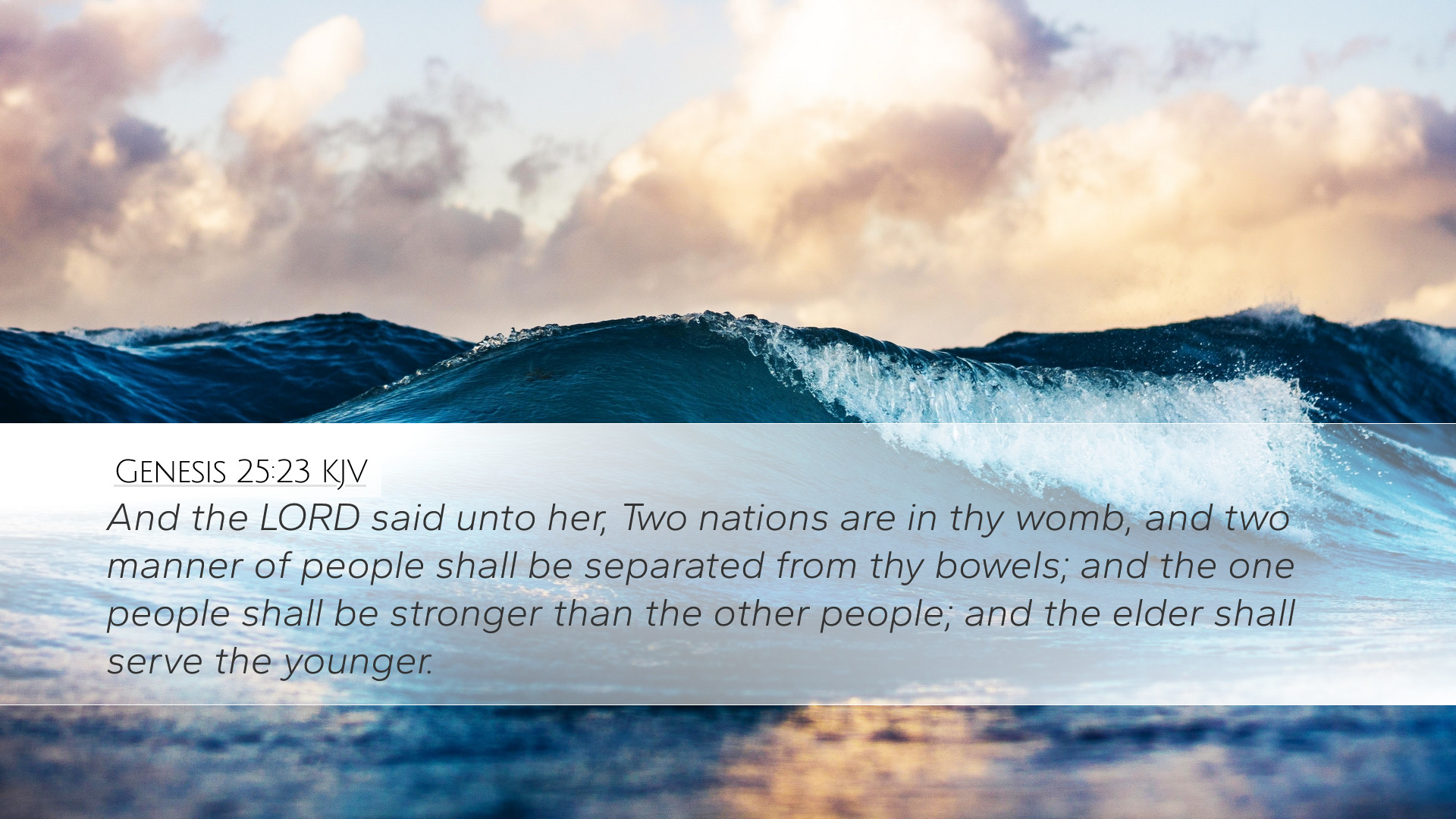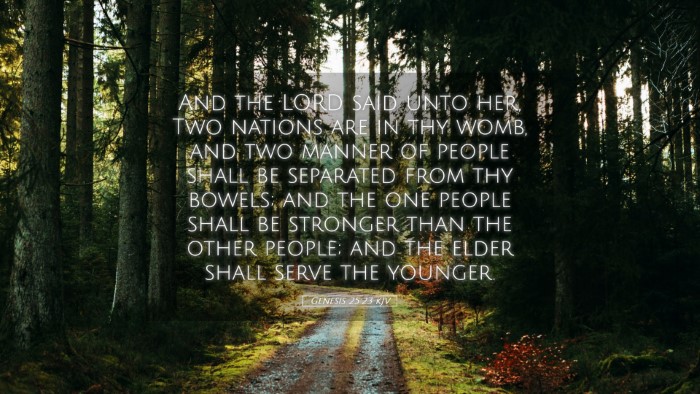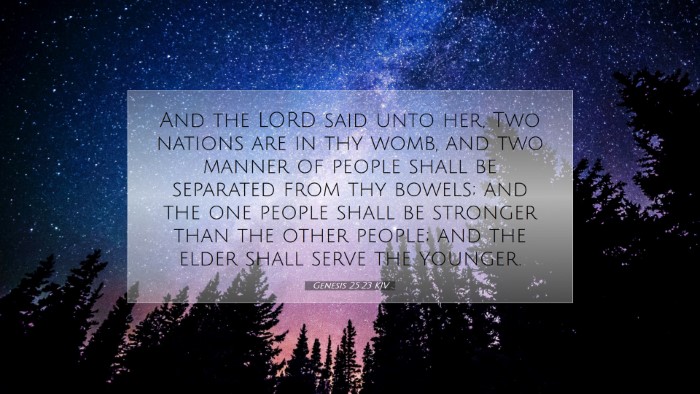Commentary on Genesis 25:23
Verse: "And the LORD said unto her, Two nations are in thy womb, and two manner of people shall be separated from thy bowels; and the one people shall be stronger than the other people; and the elder shall serve the younger." (KJV)
Introduction
This verse marks a critical moment in the narrative of the patriarchs, highlighting God's foreknowledge and sovereign plan in the lives of Isaac and Rebekah. As we analyze this verse, we pull insights from various public domain commentaries to deepen our understanding and application for contemporary audiences including pastors, students, theologians, and scholars.
Divine Revelation
In this passage, God speaks directly to Rebekah, revealing significant truths about her unborn children. This direct communication emphasizes the importance of divine revelation in the biblical narrative. Matthew Henry notes, “God's declarations are certain and immovable. When He speaks, He speaks with authority and truth.”
Two Nations
The pronouncement of "two nations" speaks to the larger implications of Rebekah’s pregnancy. Each child—Esau and Jacob—would become the progenitors of significant nations: Edom and Israel, respectively. Albert Barnes reflects, “The distinction here signifies not just individual destinies but prophetic unfolding where nations stem from individual lives.” This foreshadows the historical rivalry and theological conflicts between the Israelites and Edomites that would resonate throughout biblical history.
Separation of Peoples
The phrase "two manner of people" indicates the unique identities and destinies that these nations will possess. Adam Clarke elaborates, stating, “This separation indicates not only their differences in character and inclination but also the divine purpose is embedded in their very lives.” The differing temperaments of Esau and Jacob further illustrate this point; Esau, the rugged hunter, versus Jacob, the contemplative shepherd.
God's Sovereignty and Grace
This verse showcases God's sovereignty orchestrating events according to His divine will. The assertion that “the elder shall serve the younger” goes against contemporary cultural expectations where the firstborn typically held precedence. Barnes comments, “This inversion not only upholds God's sovereign choice but also highlights His grace which often operates contrary to human customs.”
Implications of Choice
The selection of the younger through divine purpose raises critical theological discussions. Henry says, “It is a vivid reminder that God does not conform to human standards; rather, He operates in ways that often confound human wisdom.” This inversion challenges notions of meritocracy and human legitimacy, as it presents a God who chooses based on divine intent rather than social norms.
Historical Context
Understanding the cultural backdrop of this passage is essential. In ancient Near Eastern society, the firstborn was typically favored and held special privileges. This context elucidates why God’s pronouncement would have been revolutionary. Clarke highlights, “The dynamics of family lineage, power, and inheritance are upended by this divine edict, demonstrating God’s authority over human tradition.”
Theological Reflections
- The Nature of God’s Promises: This verse affirms that God's promises are often interwoven with the lives of individuals. God's foreordained plan manifests through human existence, displaying His unwavering commitment to fulfill His word.
- Human Agency vs. Divine Sovereignty: The relationship between human choices and divine sovereignty is complex. While Jacob and Esau will choose their paths, God's plan unfolds regardless of human action. This paradox invites deeper exploration of how humans respond to divine initiative.
- Identity and Purpose: The destinies of the nations shaped by the lives of Jacob and Esau highlight the profound identity each person carries before God. It emphasizes that individual stories are pivotal in the grand narrative of God's redemptive history.
Practical Applications
This verse holds rich implications for personal and congregational reflection:
- Embrace the Unexpected: Just as God's plans for Jacob and Esau defied expectations, communities of faith are called to embrace God’s mysterious ways. This encourages openness to how God may work outside established norms.
- Value Differences: Recognizing that diverse backgrounds and characteristics can serve God's purposes fosters unity in the church, as we appreciate the unique contributions of each member.
- Awareness of God’s Sovereignty: In times of uncertainty, believers are reminded of God's overarching sovereignty, providing confidence in His ultimate control over personal and communal destinies.
Conclusion
Genesis 25:23 invites us into a deeper understanding of God's divine purpose, the significance of His sovereign choice, and the complexities of human existence. Through rich theological reflections and historical insights, this verse encourages believers to trust in God's intricate plans, which operate beyond human understanding. As pastors, students, and scholars alike delve into this passage, may they find throughout it a profound invitation to explore the depths of God's grace, His sovereign control, and the divine narrative threads woven into their own lives and communities.


